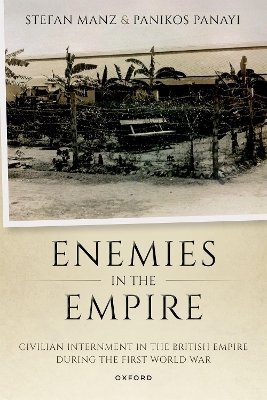
Enemies in the Empire
Oxford University Press (Verlag)
978-0-19-891215-6 (ISBN)
During the First World War, Britain was the epicentre of global mass internment and deportation operations. Germans, Austro-Hungarians, Turks, and Bulgarians who had settled in Britain and its overseas territories were deemed to be a potential danger to the realm through their ties with the Central Powers and were classified as 'enemy aliens'. A complex set of wartime legislation imposed limitations on their freedom of movement, expression, and property possession. Approximately 50,000 men and some women experienced the most drastic step of enemy alien control, namely internment behind barbed wire, in many cases for the whole duration of the war and thousands of miles away from the place of arrest. Enemies in the Empire is the first study to analyse British internment operations against civilian 'enemies' during the First World War from an imperial perspective. The narrative takes a three-pronged approach. In addition to a global examination, the volume demonstrates how internment operated on a (proto-) national scale within the three selected case studies of the metropole (Britain), a white dominion (South Africa), and a colony under direct rule (India). Stefan Manz and Panikos Panayi then bring their study to the local level by concentrating on the three camps Knockaloe (Britain), Fort Napier (South Africa), and Ahmednagar (India), allowing for detailed analyses of personal experiences. Although conditions were generally humane, the operations caused widespread suffering. The study argues that the British Empire played a key role in developing civilian internment as a central element of warfare and national security on a global scale.
Stefan Manz is Professor of Global History at Aston University, Birmingham. He is a Fellow of the Royal Historical Society and a visiting Research Associate at the University of Pretoria in South Africa. Panikos Panayi is Professor of European History at De Montfort University, Leicester. He is a Corresponding Member of the Institute for Migration and Intercultural Studies at the University of Osnabrück in Germany.
PART I: Internment in Historical and Global Perspective
1: Introduction
2: Internment in Historical and Global Perspective
3: The German Diaspora in the Empire
4: Global Germanophobia during Wartime: Public and State Responses
5: British Imperial Internment
6: The Extent and Nature of the Camp System
PART II: Metropole and Territories
7: Great Britain
8: South Africa
9: India
PART III: Life in the Camps
10: Knockaloe
11: Fort Napier
12: Ahmednagar
PART IV: Conclusion
13: The Nature and Legacy of British Imperial Internment
Appendix: Main Civilian Internment Camps in the British Empire
| Erscheinungsdatum | 03.04.2024 |
|---|---|
| Verlagsort | Oxford |
| Sprache | englisch |
| Maße | 157 x 235 mm |
| Gewicht | 592 g |
| Themenwelt | Geschichte ► Allgemeine Geschichte ► Neuzeit (bis 1918) |
| Geisteswissenschaften ► Geschichte ► Regional- / Ländergeschichte | |
| Geschichte ► Teilgebiete der Geschichte ► Wirtschaftsgeschichte | |
| ISBN-10 | 0-19-891215-3 / 0198912153 |
| ISBN-13 | 978-0-19-891215-6 / 9780198912156 |
| Zustand | Neuware |
| Haben Sie eine Frage zum Produkt? |
aus dem Bereich


